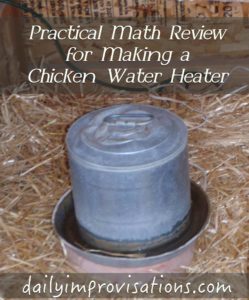
I have gotten some questions lately about making the cement-stone chicken water heater for use in other countries, where the standard electrical voltage is different from what I originally posted about. I wrote about making this chicken water heater 4 years ago on the D&B Supply blog. I have two of these handy, low maintenance heating bases and they have worked without problem for 3 winters now.
Here are the basic terms and their abbreviations that will be used in the equations:
P = power in watts
I = current in amps (A)
V = volts (in volts) (V)
R = resistance in ohms(which is volts/amps), the symbol being Ω, which you may never need again, but which was fun to find on my keyboard
・ stands for multiplication
division will be represented in the form of fractions using a diagonal slash, so a/b means “a divided by b”
The standard equations are:
P = I • V
V = I • R
They can be re-arranged as:
R = V/I
I = V/R
I = P/V
Which type of resistor you would choose depends on how much heat you want to (and can safely) generate. All other things being held constant, if the volts double, the power increases by a factor of 4, as you can see by substitution in the following way:
If P = (V/R) •V it follows that ⇨ P = V²/R
If you are attempting to end up with 40 watts of power while using 220V, the current would need to be 0.18 A, as shown by doing the math for I = P/V here:
40watts/220V = 0.18A
Plugging that into the equation R = V/I you get:
220V/0.18A = 1222.22 Ω (ohms), but the ohms are usually written in the form 1.2K ohms
If you change the watts desired while dealing with 220 volts, you get greater differences in which resistor to use than when dealing with only 110 or 120 volts. When I used the same equation for 60 watts and 220V, the resistor came out as 0.815K ohms. As always, the resistor needs to be able to handle the wattage power that will be flowing through it. Resistors come with different wattage capacity, which should be listed in a product description. If you want more of a review about what the experts sort of understand about electricity, you might read How Electricity Works on inspectapedia.com
